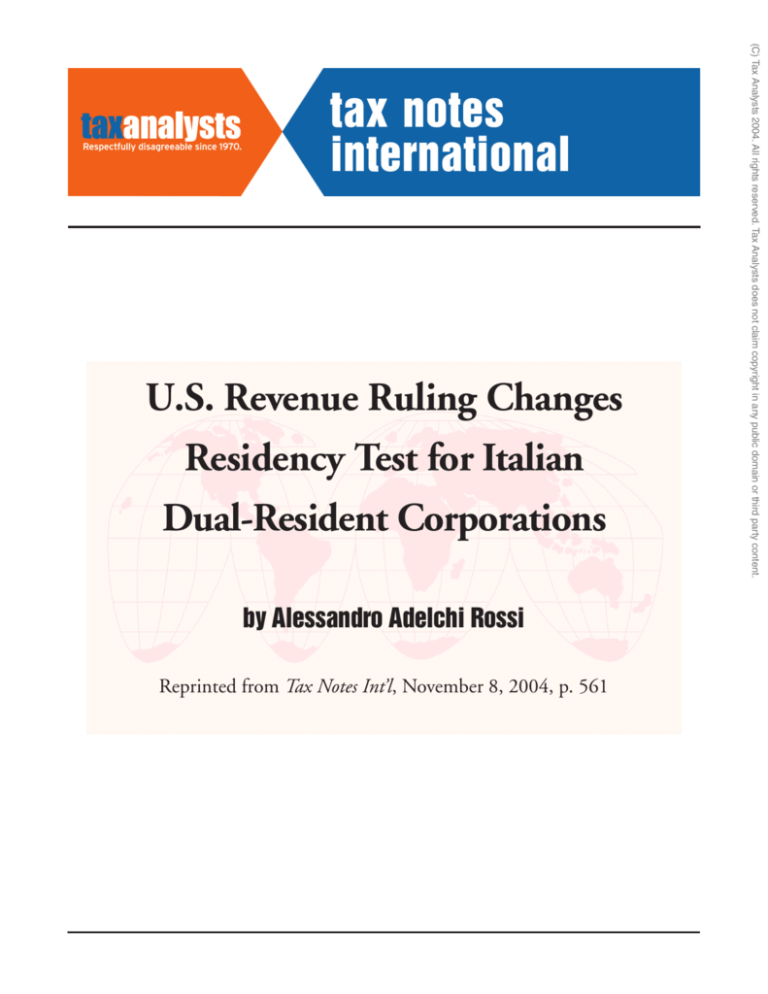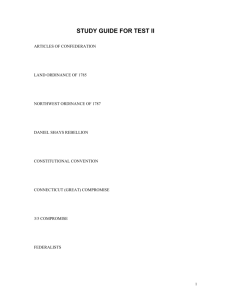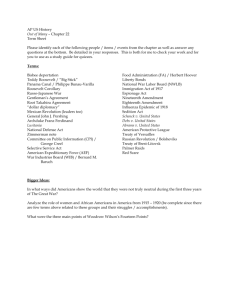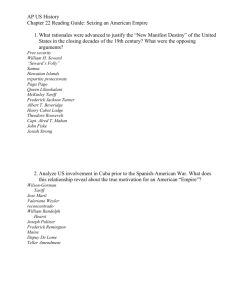
by Alessandro Adelchi Rossi
Reprinted from Tax Notes Int’l, November 8, 2004, p. 561
(C) Tax Analysts 2004. All rights reserved. Tax Analysts does not claim copyright in any public domain or third party content.
U.S. Revenue Ruling Changes
Residency Test for Italian
Dual-Resident Corporations
Copyright 2004, Tax Analysts
ISSN 1048-3306
Editor: Cathy Phillips
Special Reports Editor: Alice Keane Putman
Managing Editor: Maryam Enayat
Deputy Editor: Doug Smith
Production: Paul M. Doster
Chief of Correspondents: Cordia Scott (cscott@tax.org)
Executive Director and Publisher: Chris Bergin
Senior Executive Editor: Robert Manning
Editor-in-Chief, International: Robert Goulder
Founder: Thomas F. Field
Correspondents
Africa: Zein Kebonang, University of Botswana, Gaborone
Albania: Adriana Civici, Ministry of Finance, Tirana
Angola: Trevor Wood, Ernst & Young, Lisbon
Anguilla: Alex Richardson, Anguilla Offshore Finance Centre, Anguilla
Antigua: Donald B. Ward, PricewaterhouseCoopers Center, St. John’s
Argentina: Cristian E. Rosso Alba, Rosso Alba, Francia & Asociados, Buenos Aires
Armenia: Suren Adamyan, Association of Accountants and Auditors of Armenia, Yerevan
Australia: Graeme S. Cooper, University of Sydney, Sydney; Richard Krever, Deakin
University, Melbourne.
Austria: Markus Stefaner, Vienna University of Economics and Business Administration,
Vienna
Bahamas: Hywel Jones, Canadian Imperial Bank of Commerce Trust Company (Bahamas) Ltd.,
Nassau
Bangladesh: M. Mushtaque Ahmed, Ernst & Young, Dhaka
Barbados: Patrick B. Toppin, Pannell Kerr Forster, Christ Church
Belgium: Werner Heyvaert, Nauta Dutilh, Brussels; Marc Quaghebeur, Vandendijk & Partners,
Brussels; Marc Quaghebeur, Vandendijk & Partners, Brussels
Bermuda: Wendell Hollis, Ernst & Young, Bermuda
Botswana: I.O. Sennanyana, Deputy Director, Tax Policy, Ministry of Finance & Development
Planning, Gaborone
Brazil: David Roberto R. Soares da Silva, Farroco & Lobo Advogados, São Paulo
British Virgin Islands: William L. Blum, Solomon Pearl Blum Heymann & Stich LLP, St.
Thomas, USVI and New York
Bulgaria: Todor Tabakov, Interlex, Sofia
Cameroon: Edwin N. Forlemu, International Tax Program, Harvard University, Cambridge
Canada: Brian J. Arnold, Goodmans, Toronto, Ontario; Jack Bernstein, Aird & Berlis, Toronto,
Ontario; Martin Przysuski, Srini Lalapet, and Hendrik Swaneveld, Transfer Pricing and
Competent Authority Services, BDO Dunwoody, Toronto (Markham) Ontario
Caribbean: Bruce Zagaris, Berliner, Corcoran, and Rowe, Washington, D.C.
Cayman Islands: Timothy Ridley, Maples & Calder Asia, Hong Kong
Chile: Alex Fischer, Carey y Cia Ltda., Santiago; Macarena Navarrete, Ernst & Young, Santiago
China (P.R.C.): Jinyan Li, York University, Toronto; Lawrence Sussman, O’Melveny & Myers
LLP, Beijing
Cook Islands: David R. McNair, Southpac Trust Limited, Rarotonga
Croatia: Hrvoje Zgombic, Zgombic & Partners, Zagreb
Cyprus: Theodoros Philippou, PricewaterhouseCoopers, Nicosia
Czech Republic: Michal Dlouhy, White & Case, Prague
Denmark: Nikolaj Bjørnholm, Bech-Bruun Dragsted Law Firm, Copenhagen
Dominican Republic: Dr. Fernándo Ravelo Alvarez, Santo Domingo
Eastern Europe: Iurie Lungu, Graham & Levintsa, Chisinau
Egypt: Farrouk Metwally, Ernst & Young, Cairo
Estonia: Helen Pahapill, Ministry of Finance, Tallinn
European Union: Joann M. Weiner, Facultés Universitaires Saint-Louis, Brussels
Fiji: Bruce Sutton, KPMG Peat Marwick, Suva
Finland: Marjaana Helminen, University of Helsinki in the Faculty of Law, Helsinki
France: Olivier Delattre, Latham & Watkins, Paris
Gambia: Samba Ebrima Saye, Income Tax Division, Banjul
Germany: Jörg-Dietrich Kramer, Ministry of Finance, Berlin/Bonn; Rosemarie Portner, Meilicke
Hoffmann & Partner, Bonn; Klaus Sieker, Flick Gocke Schaumburg, Frankfurt
Ghana: Seth Terkper, Chartered Accountant/Tax Expert, Accra
Gibraltar: Charles D. Serruya, Baker Tilly, Gibraltar
Greece: Alexandra Gavrielides, Athens
Guam: Stephen A. Cohen, Carlsmith Ball LLP, Hagatna
Guernsey: Neil Crocker, PricewaterhouseCoopers, St. Peter Port
Guyana: Lancelot A. Atherly, Georgetown
Hong Kong: Colin Farrell, PricewaterhouseCoopers, Hong Kong
Hungary: Daniel Deak, Budapest University of Economics, Budapest
Iceland: Indridi H. Thorlaksson, Reykjavik
India: Nishith M. Desai, Nishith Desai Associates, Mumbai; Sanjay Sanghvi, RSM & Co., Mumbai
Indonesia: Freddy Karyadi, Karyadi & Co Law and Tax Office, Jakarta
Iran: Mohammad Tavakkol, Maliyat Journal, College of Economic Affairs, Tehran
Ireland: Kevin McLoughlin, Ernst & Young, Dublin
Isle of Man: Richard Vanderplank, Cains Advocates & Notaries, Douglas
Israel: Joel Lubell, Teva Pharmaceutical Industries, Ltd., Petach Tikva; Doron Herman, S. Friedman
& Co. Advocates & Notaries, Tel-Aviv
Italy: Alessandro Adelchi Rossi and Luigi Perin, George R. Funaro & Co., P.C., New York;
Gianluca Queiroli, Cambridge, Massachusetts
Japan: Gary Thomas, White & Case, Tokyo; Shimon Takagi, White & Case, Tokyo
Jersey: J. Paul Frith, Ernst & Young, St. Helier
Kenya: Glenday Graham, Ministry of Finance and Planning, Nairobi
Korea: Chang Hee Lee, Seoul National Univ. College of Law, Seoul, Korea
Kuwait: Abdullah Kh. Al-Ayoub, Kuwait
Latin America: Ernst & Young LLP, Miami
Latvia: Andrejs Birums, Tax Policy Department, Ministry of Finance, Riga
Lebanon: Fuad S. Kawar, Beirut
Libya: Ibrahim Baruni, Ibrahim Baruni & Co., Tripoli
Lithuania: Nora Vitkuniene, International Tax Division, Ministry of Finance, Vilnius
Luxembourg: Jean-Baptiste Brekelmans, Loyens & Loeff, Luxembourg
Malawi: Clement L. Mononga, Assistant Commisioner of Tax, Blantyre
Malaysia: Jeyapalan Kasipillai, University Utara, Sintok
Malta: Dr. Antoine Fiott, Zammit Tabona Bonello & Co., and Lecturer in Taxation, Faculty of Law,
University of Malta, Valletta
Mauritius: Ram L. Roy, PricewaterhouseCoopers, Port Louis
Mexico: Jaime Gonzalez-Bendiksen, Baker & McKenzie, Juarez, Tijuana, Monterrey, and
Guadalajara; Ricardo Leon-Santacruz, Sanchez-DeVanny Eseverri, Monterrey
Middle East: Aziz Nishtar, Nishtar & Zafar, Karachi, Pakistan
Monaco: Eamon McGregor, Moores Rowland Corporate Services, Monte Carlo
Mongolia: Baldangiin Ganhuleg, General Department of National Taxation, Ulaanbaatar
Morocco: Mohamed Marzak, Agadir
Myanmar: Timothy J. Holzer, Baker & McKenzie, Singapore
Nauru: Peter H. MacSporran, Melbourne
Nepal: Prem Karki, Regional Director, Regional Treasury Directoriate, Kathmandu
Netherlands: Eric van der Stoel, Otterspeer, Haasnoot & Partners, Rotterdam; Dick Hofland,
Freshfields, Amsterdam; Michaela Vrouwenvelder, Amsterdam; Jan Ter Wisch, Allen & Overy,
Amsterdam
Netherlands Antilles: Dennis Cijntje, KPMG Meijburg & Co., Curaçao; Koen Lozie, Deurle
New Zealand: Adrian Sawyer, University of Canterbury, Christchurch
Nigeria: Elias Aderemi Sulu, Lagos
Northern Mariana Islands: John A. Manglona, Saipan
Norway: Frederik Zimmer, Department of Public and International Law, University of Oslo, Oslo
Oman: Fudli R. Talyarkhan, Ernst & Young, Muscat
Panama: Leroy Watson, Arias, Fabrega & Fabrega, Panama City
Papua New Guinea: Lutz K. Heim, Ernst & Young, Port Moresby
Peru: Italo Fernández Origgi, Yori Law Firm, Lima
Philippines: Benedicta Du Baladad, Bureau of Internal Revenue, Manila
Poland: Dr. Janusz Fiszer, Warsaw University/White & Case, Warsaw
Portugal: Francisco de Sousa da Câmara, Morais Leitao & J. Galvão Teles, Lisbon; Manuel
Anselmo Torres, Galhardo Vilão, Torres, Lisbon
Qatar: Finbarr Sexton, Ernst & Young, Doha
Romania: Sorin Adrian Anghel, Senior Finance Officer & Vice President, The Chase Manhattan
Bank, Bucharest
Russia: Scott C. Antel, Ernst & Young, Moscow; Joel McDonald, Salans, London
Saint Kitts–Nevis: Mario M. Novello, Nevis Services Limited, Red Bank
Saudi Arabia: Fauzi Awad, Saba, Abulkhair & Co., Dammam
Sierra Leone: Shakib N.K. Basma and Berthan Macaulay, Basma & Macaulay, Freetown
Singapore: Linda Ng, White & Case, Tokyo, Japan
Slovakia: Alzbeta Harvey, Principal, KPMG New York
South Africa: Peter Surtees, Deneys Reitz, Cape Town
Spain: José M. Calderón, University of La Coruña, La Coruña
Sri Lanka: D.D.M. Waidyasekera, Mt. Lavinia
Sweden: Leif Mutén, Professor Emeritus, Stockholm School of Economics
Taiwan: Keye S. Wu, Baker & McKenzie, Taipei; Yu Ming-i, Ministry of Finance, Taipei
Trinidad & Tobago: Rolston Nelson, Port of Spain
Tunisia: Lassaad M. Bediri, Hamza, Bediri & Co., Legal and Tax Consultants, Tunis
Turkey: Mustafa Çamlica, Ernst & Young, Istanbul
Turks & Caicos Islands, British West Indies: Ariel Misick, Misick and Stanbrook, Grand Turk
Uganda: Frederick Ssekandi, Kampala
United Arab Emirates: Nicholas J. Love, Ernst & Young, Abu Dhabi
United Kingdom: Trevor Johnson, Trevor Johnson Associates, Wirral; Eileen O’Grady,
barrister, London; Jefferson P. VanderWolk, Baker & McKenzie, London
United States: Richard Doernberg, Emory Univ. School of Law, Atlanta GA.; James Fuller,
Fenwick & West, Palo Alto
U.S. Virgin Islands: Marjorie Rawls Roberts, Attorney at Law, St. Thomas, USVI
Uruguay: Dr. James A. Whitelaw, Whitelaw Attorneys, Uruguay
Uzbekistan: Ian P. Slater, Arthur Andersen, Almaty
Vanuatu: Bill L. Hawkes, KPMG, Port Vila
Venezuela: Ronald Evans, Baker & McKenzie, Caracas
Vietnam: Frederick Burke, Baker & McKenzie, Ho Chi Minh City
Western Samoa: Maiava V.R. Peteru, Kamu & Peteru, Apia
Yugoslavia: Danijel Pantic, European Consulting Group, Belgrade
Zambia: W Z Mwanza, KPMG Peat Marwick, Lusaka
Zimbabwe: Prof. Ben Hlatshwayo, University of Zimbabwe, Harare
(C) Tax Analysts 2004. All rights reserved. Tax Analysts does not claim copyright in any public domain or third party content.
TAX NOTES INTERNATIONAL
Practitioners’ Corner
by Alessandro Adelchi Rossi
Alessandro Adelchi Rossi is with George R.
Funaro & Co., P.C., in New York.
A
ruling recently issued by the U.S. Internal
Revenue Service affects the U.S. operations
of those Italian corporations that are resident under the laws of both Italy and another country. In
Rev. Rul. 2004-76, the IRS addressed the issue of
a non-U.S. corporation that is potentially a resident of two foreign countries, each of which is
party to a tax treaty with the United States. The
IRS held that the rule in the treaty between the
two foreign countries would be followed to determine where the corporation is resident, and the
U.S. treaty with that country will then govern.
The ruling represents a sharp change in the IRS’s
view on this matter, in line with the U.S. treaty
policy. (For the revenue ruling, see 2004 WTD
134-13 or Doc 2004-14272.)
The Concept of Dual Residency
Dual residency can occur in different ways. In a
treaty context, dual residency can arise when a
corporation is incorporated in one country and
managed in another. Less frequently, it can occur
when an entity is literally incorporated in two
countries.1 For example, a similar situation might
arise under the combined laws of Delaware and
the Canadian province of Nova Scotia. While Delaware corporate law allows a corporation to “cont i n u e ” i n a n o n - U. S. j u r i s d i c t i o n w i t h o u t
“discontinuing” in Delaware, Nova Scotia corporate law allows a corporation organized under the
statute of another jurisdiction to “continue” under
the Nova Scotia statute without “discontinuing”
under the statute of origination.2
1In the United States, Rev. Rul. 88-25 treats a similar event
as an inbound reorganization. Although the ruling under review
would not apply to those facts, presumably it is part of the IRS’s
response to the issues that can arise from dual residency.
2See
Nathan Boidman, “International Mergers & Acquisitions:
A Forum for Discussion,” Tax Notes Int’l, Apr. 12, 2004, p. 185.
Tax Notes International
Residence of a Corporation Under
Italian Domestic Law
For domestic purposes, to determine if a corporation is a resident of Italy, Italian tax law classifies corporations by their physical activities (for
example, management, control, and assets) in Italy. Thus, a corporation is considered resident in
Italy if its registered office,3 main activity, or effective place of management is in Italy for 183
days or more during a tax year.4
Thus, if a corporation is incorporated in one
country and is managed in Italy, that corporation
is potentially a resident of both Italy and another
country. If, like Italy, the other country is party to
a t a x t r e a t y w i t h t h e U n i t e d S t a t e s, t h e
dual-resident corporation may qualify under two
U.S. treaties.
Residence of a Corporation Under the
Italy-United States Tax Treaty
In defining the residence of a corporation, the
Italy-United States tax treaty in force5 looks to
the place of incorporation or to the place of management. Unlike it does for individuals, the current treaty does not provide a tiebreaker rule for
corporations considered to be residents of both Italy and the United States. Instead, the treaty provides that Italy and the United States can tax
their residents without reference to the treaty.6
Accordingly, dual-resident corporations are permissible under the current treaty.
3Although for tax purposes Italy applies the test of the registered office, under corporate law the test adopted by Italy is that
of the “law of incorporation.” Thus, a corporation organized under
Italian laws that moves its registered office abroad is still subject
to Italian law. See art. 25 of Legge 218/1995.
4See
Testo Unico delle Imposte sui Redditi, art 73(3).
5The
current tax treaty and protocol entered into force on Dec.
20, 1985.
6See
article 1(2)(a) of the Italy-United States tax treaty.
November 8, 2004
•
561
(C) Tax Analysts 2004. All rights reserved. Tax Analysts does not claim copyright in any public domain or third party content.
U.S. Revenue Ruling Changes Residency
Test for Italian Dual-Resident Corporations
Practitioners’ Corner
The IRS’s Prior Position
The IRS’s Current View
Under the U.S. tax treaties that were applicable
when Rev. Rul. 73-564 was issued, the determination of whether a corporation was a resident did
not depend on whether the corporation was liable
to tax in that country. Conversely, the more recent
treaty policy is to provide treaty benefits depending on whether the foreign corporation is treated
as a resident of the foreign country for the tax purposes of the two foreign countries.
With the intent, presumably, to be consistent
with this policy, on July 12, 2004, the IRS issued
Rev. Rul. 2004-76. In this ruling the IRS held that
where the treaty between two foreign countries allocates residency of a corporation to one of those
foreign countries, then only the U.S. tax treaty
with that country would apply to the foreign
corporation.
In light of the foregoing, in the preceding example
one should look at the relevant article of the ItalySwitzerland tax treaty to determine which country has tax jurisdiction over corporation Alpha.
Article 4(3) of that treaty states that if the taxpayer is resident in both countries under the respective domestic laws, it will be deemed resident only
in the country where its effective management is
located. Thus, under Rev. Rul. 2004-76, Alpha will
be treated as a resident of Italy and can only claim
the benefits under the Italy-United States treaty.
✦
7See
article 11(1) of the Switzerland-United States tax treaty,
which entered into force on December 19, 1997.
562 • November 8, 2004
Tax Notes International
(C) Tax Analysts 2004. All rights reserved. Tax Analysts does not claim copyright in any public domain or third party content.
Until recently, a foreign dual-resident corporation could choose which U.S. treaty it wanted to
use for treaty benefits because in Rev. Rul. 73-564
the U.S. authorities allowed the corporation to
choose the treaty that produced the better result.
At that time, U.S. tax treaties did not hinge residency determination on whether a corporation
was subject to tax as a resident in the foreign
country that was a party to a U.S. tax treaty. Accordingly, the following situation might have
arisen:
Example: Alpha is a corporation organized under the laws of Switzerland that has its central
management and control in Italy. Alpha conducts
business in both Switzerland and Italy. Alpha,
through its Swiss branch, grants a loan to a borrower located in the United States and receives
interest payments from that loan.
Assuming that the corporation in the example
above did not have a permanent establishment in
the United States, it could have chosen to apply
the provisions of either the Italy-United States
treaty or the Switzerland-United States treaty to
the interest received from U.S. sources because it
qualified for treatment under the income tax conventions the United States had with both
countries.
Although the Italian treaty imposes a 15 percent withholding rate, the Swiss treaty generally
exempts interest payments from U.S. tax.7 Accordingly, for U.S. tax purposes, the dual-resident
corporation in the example would be better off using the Switzerland-United States tax treaty, pro-
vided that the limitation on benefits provision is
satisfied.









